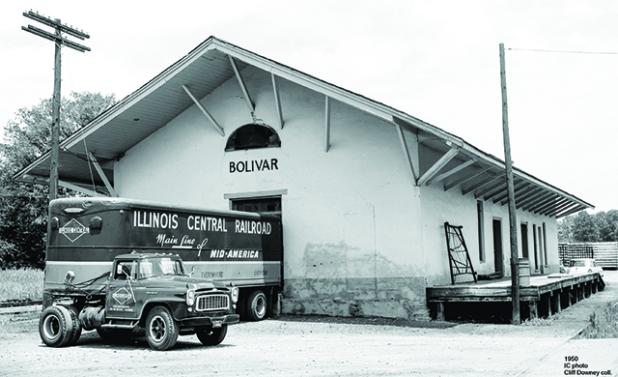
Along the Hardeman County Rail Lines
The advent of trains and train travel changed lives for people; a journey across the country that had previously taken weeks or even months of arduous and dangerous travel by wagon could now be done in a matter of days. Traveling on the rails was long, dusty, and dirty; but those were usually minor inconveniences when compared to the excitement of the journey itself. In Hardeman County, Grand Junction was truly a “railroad town”; it was named because of the North/South and East/West rail line junctions. Other towns in the county actually changed the townsite location because of where the trains decided to run the rail lines. Places like Saulsbury (originally Berlin), Middleton (originally Slab Town), and Hornsby (Crainsville) moved their town sites so they could locate the town and its businesses near the rail lines. The rail lines for Bolivar ran along the Illinois Central's former Jackson District (which stretched from Jackson, Tennessee, south to Water Valley Junction, Mississippi).
The tracks through Bolivar were laid in the 1850s by the Mississippi Central & Tennessee Railroad. After changing ownership a couple of times, the Illinois Central (IC) acquired the tracks in the late 1870s. The IC’s mainline ran traffic between Chicago and New Orleans in the Jackson, Tennessee district until around 1890. The IC then took over several lines running into Memphis and eventually all mainline traffic was shifted onto those lines. This caused traffic in the Jackson district to drop off dramatically and passenger services were discontinued in 1941. The tracks from Jackson down to Bolivar were taken up in 1982, leaving Bolivar with only the memories of the train coming through town and its once busy depot.
Many of the passenger trains, unlike their later counterparts, did not have dining cars. Towns that were fortunate enough to be along the rail lines quickly remedied that situation. Hotels would spring up and provide not only lodging for travelers but meals as well. Telegraph operators could send a message down the line with just a few clicks to let a depot, and subsequently a hotel, know where the train was and approximately how long it would take to get to their stop. This allowed hotels to be able to serve piping hot meals to weary and hungry travelers who would marvel at their efficiency.
It was not unusual for the railroads to become involved in building the hotels, and that is how one hotel in our county came into existence. The Commercial Hotel in Grand Junction was built in the 1850’s and was originally known as the Railroad Hotel because of its location at the crossing of the Memphis and Charleston and the Illinois Central Railroads. This hotel encompassed almost an entire block in town and had a large dining room to accommodate train travelers at mealtimes. The three-story structure had rooms on the second and third floors and the dining room, sitting rooms, baggage, rooms, a telegraph office, and a barbershop, among others, on its first floor.
The hotel became known as the Commercial Hotel around the turn of the 1900s and it was managed for many years by Anthony and Cynthia McLeran. Mr. McLeran, a native of North Carolina, found his way to North Mississippi and established a mercantile business. He enlisted in the Confederate Army, Company C, 26th Mississippi Regiment; he surrendered at Appomattox and received an honorable discharge at Point Lookout, Maryland. After the war he returned to North Mississippi and came to Grand Junction with his wife and five children in 1902. The McLerans were active in the Presbyterian Church and in the Grand Junction community for many years. Sadly, the old hotel was torn down in 1923, ending an era for sure.
During the National Field Trials the hotel would also become home to the many people who were in town for the National Field Trials over at the Ames Plantation. Mr. Hobart Ames would frequently send a wagon to the hotel each day to pick up lunches for the riders. There must have been a great energy around this and other hotels in the town each February – the hiss and rattle of the train, the sounds of the riders talking to each other and to their horses, the sounds of the horses, and townsfolk watching and discussing it all.
When you drive across the train tracks, think about all the people from all over the country and the world who have come through our county, so many of them traveling here on the miles and miles of rail lines that at one time criss crossed our county. If you find yourself in Grand Junction, or just about anywhere in the southern part of our county, over the next few days, take a minute a listen for one of the world’s most marvelous sounds – the beautiful sound of the train in the distance.
Photo: The Bolivar Depot, date unknown
